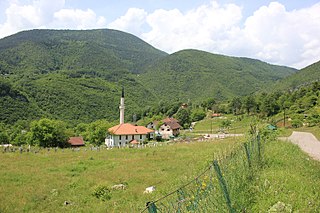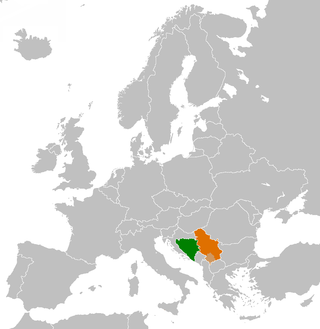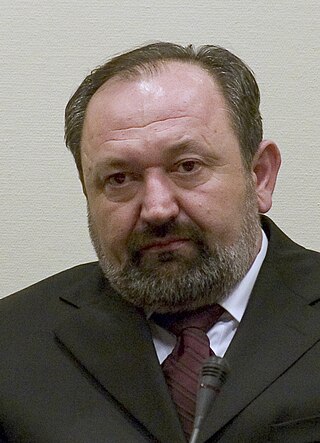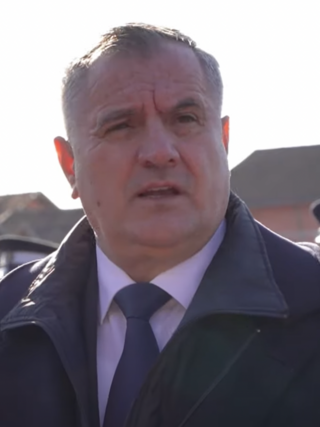Contents
| |||||
| Decades: | |||||
|---|---|---|---|---|---|
| See also: | |||||
Events in the year 2015 in Bosnia and Herzegovina .
| |||||
| Decades: | |||||
|---|---|---|---|---|---|
| See also: | |||||
Events in the year 2015 in Bosnia and Herzegovina .

Srebrenica is a town and municipality in Republika Srpska, Bosnia and Herzegovina. It is a small mountain town, with its main industry being salt mining and a nearby spa.

The Srebrenica massacre, also known as the Srebrenica genocide, was the July 1995 genocidal killing of more than 8,000 Bosniak Muslim men and boys in and around the town of Srebrenica during the Bosnian War. It was mainly perpetrated by units of the Bosnian Serb Army of Republika Srpska under Ratko Mladić, though the Serb paramilitary unit Scorpions also participated. The massacre was the first legally recognised genocide in Europe since the end of World War II.

The Republika Srpska was a self-proclaimed statelet in Southeastern Europe under the control of the Army of Republika Srpska during the Bosnian War. It claimed to be a sovereign state, though this claim was only partially recognized by the Bosnian government in the Geneva agreement, the United Nations, and FR Yugoslavia. For the first six months of its existence, it was known as the Serbian Republic of Bosnia and Herzegovina.

Podrinje is the Slavic name of the Drina river basin, known in English as the Drina Valley. The Drina basin is shared between Bosnia and Herzegovina and Serbia, with majority of its territory being located in Eastern Bosnia, entire Upper Drina course and majority of the Middle course, while the Lower Drina course is shared between two countries,with the river representing border. The part of the Drina basin located in Bosnia and Herzegovina is also called Eastern Bosnia.

Milorad Dodik is a Bosnian Serb politician serving as the 8th president of Republika Srpska since 2022, having previously served from 2010 to 2018. He also served as the 7th Serb member of the Presidency of Bosnia and Herzegovina from 2018 to 2022.

Žepa is a village located in the municipality of Rogatica, Republika Srpska, Bosnia and Herzegovina. As of 2013 census, it has a population of 133 inhabitants. It is situated northeast of Rogatica itself on the banks of short river with a same name, the Žepa river, which flows into the Drina river nearby, in a valley between the mountains Javor and Devetak.

The Višegrad massacres were acts of mass murder committed against the Bosniak civilian population of the town and municipality of Višegrad during the ethnic cleansing of eastern Bosnia by Republika Srpska police and military forces during the spring and summer of 1992, at the start of the Bosnian War.

The modern-day countries of Bosnia and Herzegovina and Serbia both originated from Yugoslavia. The majority of population in both countries speak one of the standard varieties of Serbo-Croatian and Serbia is one of the largest investors in Bosnia and Herzegovina.

The siege of Srebrenica was a three-year siege of the town of Srebrenica in eastern Bosnia and Herzegovina which lasted from April 1992 to July 1995 during the Bosnian War. Initially assaulted by the Yugoslav People's Army (JNA) and the Serbian Volunteer Guard (SDG), the town was encircled by the Army of Republika Srpska (VRS) in May 1992, starting a brutal siege which was to last for the majority of the Bosnian War. In June 1995, the commander of the Army of the Republic of Bosnia and Herzegovina (ARBiH) in the enclave, Naser Orić, left Srebrenica and fled to the town of Tuzla. He was subsequently replaced by his deputy, Major Ramiz Bećirović.

Report about Case Srebrenica (the first part) was a controversial official report on the July 1995 Srebrenica massacre in eastern Bosnia and Herzegovina. It was prepared by Darko Trifunović and published by the Republika Srpska Government Bureau for Relations with the International Criminal Tribunal for the Former Yugoslavia (ICTY).
The Kravica attack was an attack on the Bosnian Serb village of Kravica by the Army of the Republic of Bosnia and Herzegovina (ARBiH) from the Srebrenica enclave on Orthodox Christmas Day, 7 January 1993. The attack was organized to coincide with the Serbian Orthodox Christmas, leaving the Serbs unprepared for any attack. 43-46 people died in the attack on the Serb side: 30-35 soldiers and 11-13 civilians.

Vujadin Popović is a Bosnian Serb war criminal, who participated in the War in Bosnia and Herzegovina and was convicted of genocide, extermination, murder and persecution and sentenced to life in prison. He was Lieutenant Colonel and the Chief of Security of the Drina Corps of the Army of Republika Srpska.
The 2015 Zvornik police station shooting happened on April 27, 2015, when a gunman attacked a police station in Zvornik in the Republika Srpska entity of Bosnia and Herzegovina. He killed a police officer and wounded two others before being shot dead by other police officers. This was the first attack of its kind in Republika Srpska; attacks have occurred in the other entity, the Federation of Bosnia and Herzegovina, including the 1997 Mostar car bombing.
The Bijeli Potok massacre refers to the mass killing of 675 Bosniak civilians by Serbs on 1 June 1992 in the settlement Bijeli Potok within the village Đulići, located in the municipality of Zvornik, Bosnia and Herzegovina. About 675 Bosniak men and boys, from the multiple villages around Zvornik, were separated from their families by Serb forces, and slaughtered within a week at Bijeli Potok and their bodies hidden in mass graves throughout the Drina Valley.
Operation Ruben was a police raid operation targeting what police said were suspected radical Islamists in the Republika Srpska, an entity of Bosnia and Herzegovina. It commenced on 6 May 2015, following an attack on a police station in Zvornik. Several people were arrested a week after the attack.
Events in the year 2016 in Bosnia and Herzegovina.

Bosnian genocide denial is the act of denying the occurrence of the systematic genocide against the Bosniak Muslim population of Bosnia and Herzegovina, or asserting it did not occur in the manner or to the extent that has been established by the International Criminal Tribunal for the former Yugoslavia (ICTY) and the International Court of Justice (ICJ) through proceedings and judgments, and described by comprehensive scholarship.
Events in the year 2018 in Bosnia and Herzegovina.

Radovan Višković is a Bosnian Serb politician serving as the 12th and current Prime Minister of Republika Srpska since December 2018. He is a member of the Alliance of Independent Social Democrats.